College News

Professor Richard Tedeschi and fellow researcher Lawrence Calhoun, UNC Charlotte emeritus professor in psychology, years ago coined the phrase “posttraumatic growth” to describe what they have witnessed – that some people will grow and change in new ways after they undergo trauma. Their work has continued to grow and evolve, as they find new avenues of research, gain new collaborators, mentor new students and influence authors of popular press books and researchers.

Call him an earth sleuth. Wenwu Tang, assistant professor in the Department of Geography and Earth Sciences, scoops up information from a targeted locale and analyzes it for clues to address any number of societal problems with a spatial component. With his research, Tang looks at land use, land cover change, how traffic patterns may influence transportation, how pedestrians or animals may move in an area or even how disease may spread.

Faculty members who demonstrate significant impact within and beyond their classrooms can be recognized with one of UNC Charlotte’s top honors – the Bank of America Award for Teaching Excellence. Finalists for this award include four College of Liberal Arts & Sciences faculty. They are Michèle Bissière, Scott Fitzgerald, Kirk Melnikoff and Coral Wayland.

UNC Charlotte Model United Nations students in spring 2017 competed internationally at the Harvard World United Nations in Montreal, Canada, where they vied against 2,000 university students from more than 115 countries. Delegates brought home highest honors for individual participants, with two awards for verbal communications.
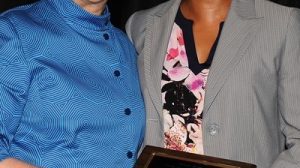
For her commitment to teaching at the beginning of her academic career, Jennifer Webb, associate professor in the Department of Psychological Science, is this year’s recipient of the Bonnie E. Cone Early-Career Professorship in Teaching. Provost Joan Lorden announced the honor at University Convocation, Thursday, Aug. 17, 2017.
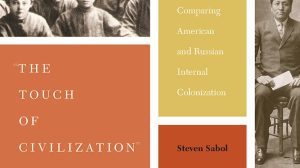
Historian Steven Sabol’s new book is a happy coincidence of fly-fishing and history. During a 2006 fishing trip to trout-filled Nez Perce Creek in Yellowstone National Park, Sabol spied a sign with tantalizing details about the flight of the Nez Perce through the park in the 19th century. The sign set Sabol on a comparative history journey exploring the treatment of nomadic people by two empires – the U.S. and Russia.

In her book, “Thomas Wolfe and Lost Children in Southern Literature,” scholar Paula Gallant Eckard calls upon Thomas Wolfe’s evocative and autobiographical novella “The Lost Boy” as a touchstone for her analysis of a group of contemporary southern novels. She draws upon her writing and research to enliven learning for her students.
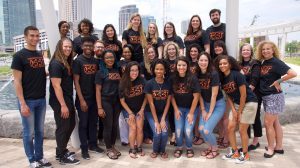
Undergraduate students from around the nation who may have thought graduate school was out of their reach found out in a one-week summer institute at UNC Charlotte that it is within their grasp. UNC Charlotte’s Organizational Science Summer Institute. The institute seeks to diversify the field of organizational science through professional development, specifically targeting historically underrepresented undergraduate students.
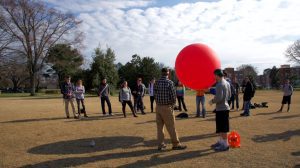
UNC Charlotte students work together to prepare a giant red balloon for liftoff. They have attached a camera to the balloon’s string to take aerial photographs of the UNC Charlotte campus that they will use to create a map. Through exercises like this one, students in the geography class on spatial thinking gain hands-on experience that expands their understanding of the concept, which offers a geographic perspective on how objects, processes and phenomena relate to each other in time and space.

More than 100 undergraduate students competed in the 2017 Summer Research Symposium, with three College of Liberal Arts & Sciences students named the winners. “These are the agile minds that will advance understanding in many areas that affect our lives,” distinguished researcher Pinku Mukherjee said of the participants in the university’s research programs.

UNC Charlotte author Bryn Chancellor’s debut novel, Sycamore, has earned critical acclaim on the national stage, lauded as a riveting tale of how a teen-age girl’s mysterious disappearance has haunted her Arizona hometown and how the discovery of her remains leads to unexpected healing and forgiveness.
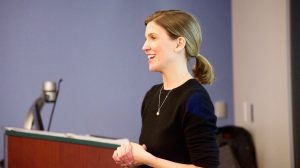
For a film that illustrates how the arts can promote healing in healthcare settings, UNC Charlotte researcher Margaret M. Quinlan and colleagues Lynn Harter and Evan Shaw have earned a regional Emmy® nomination from the Ohio Valley Chapter of the National Academy of Television Arts and Sciences.